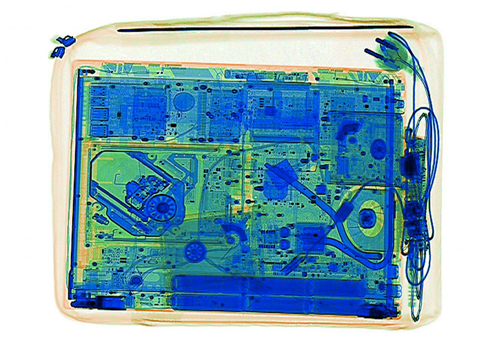Appeals Court blocks on Trump travel ban
 An illustrated picture shows a laptop on the screen of an X-ray security scanner, April 7. The classified information Trump allegedly gave to Russian officials reportedly concerned an ISIS plot connected with aviation security. The U.S. recently introduced a laptop ban on inbound U.S. flights from several Middle Eastern countries - Reuters
An illustrated picture shows a laptop on the screen of an X-ray security scanner, April 7. The classified information Trump allegedly gave to Russian officials reportedly concerned an ISIS plot connected with aviation security. The U.S. recently introduced a laptop ban on inbound U.S. flights from several Middle Eastern countries - Reuters
LOS ANGELES: A US appeals court yesterday left in place a block on President Donald Trump's travel ban targeting citizens from six Muslim majority nations-the latest in a string of judicial blows for the controversial measure. The US Court of Appeals for the Ninth Circuit largely upheld an injunction on the ban issued by a lower court, but however said the government was within its right to review the vetting process for people entering the country.
"Immigration, even for the president, is not a one-person show," the ruling said. "The president, in issuing the executive order, exceeded the scope of the authority delegated to him by Congress." The decision came just ahead of a deadline for states challenging the ban to submit briefings before the US Supreme Court in response to the Trump administration's request that the nine justices hear the case.
The US Justice Department filed an emergency application to the Supreme Court on June 1, urging it to undo two lower court rulings blocking Trump's decision to prevent entry to travelers from Iran, Libya, Somalia, Sudan, Syria and Yemen for 90 days. The Trump administration argues the ban is needed to ward off terrorist attacks in the country. Critics say the ban is discriminatory and violates the US constitution by specifically targeting Muslim-majority countries.
In another development, Israeli government spies hacked into the operations of Islamic State bombmakers to discover they were developing a laptop computer bomb to blow up a commercial aircraft, the New York Times reported yesterday. The Times said the work by Israeli cyber operators was a rare success of western intelligence against the constantly evolving, encryption-protected and social-media-driven cyber operations of the extremist group.
It said the Israeli hackers penetrated the small Syria-based cell of bombmakers months ago, an effort that led to the March 21 ban on carry-on laptops and other electronics larger than cellphones on direct flights to the United States from 10 airports in Turkey, the Middle East and North Africa. The Israeli cyber-penetration "was how the United States learned that the terrorist group was working to make explosives that fooled airport X-ray machines and other screening by looking exactly like batteries for laptop computers," the Times said.
The intelligence was so good that the detonation method for the bombs was understood, the Times said, citing two US officials familiar with the operation. Following the US laptop ban, Britain announced a similar prohibition for flights originating from six countries. Israel's contribution to the intelligence on the laptop bombs became public after President Donald Trump revealed details on it to Russian Foreign Minister Sergei Lavrov in a May 10 White House meeting. Trump's disclosure "infuriated" Israeli officials, according to the Times.- Agencies

